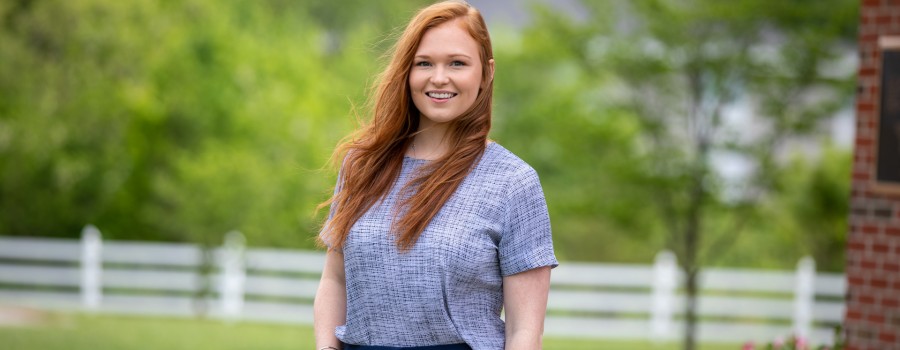Make a lasting difference in the lives of others!
Now more than ever, there is a growing demand for licensed counseling professionals to address mental health issues. Everyone needs someone they can trust to help them when mental health and emotional issues disrupt their lives. As more Americans become aware of the benefits of mental health counseling – whether the underlying issues are mental, emotional, relational, or a mix of all three – this swiftly growing field will only continue to flourish. And with it, more people’s lives will flourish too.
By the numbers
Programs & Requirements
Master's in Clinical Mental Health Counseling
University of the Cumberlands’ master’s in clinical mental health counseling program covers the skills you’ll need as a licensed counseling professional to assess patients, diagnose mental disorders, and effectively deliver treatment. You’ll learn how to work closely with patients in individual, group, and family settings and explore professional counseling strategies for diverse populations, from children to the elderly. There’s no limit to the number of lives you’ll have the chance to influence for the better with a master’s degree in clinical mental health counseling!
Cumberlands’ online Master’s Degree in Clinical Mental Health Counseling covers the foundational knowledge you need. You will undergo the practicums and internships needed to pursue relevant licensures. In short, you will gain invaluable experience and skills to help prepare you to give others the wellness care they need. Our master’s in clinical mental health counseling online program is designed to serve both recent baccalaureate graduates and professionals desiring to broaden their expertise as mental health counselors.
The Master’s in Clinical Mental Health Counseling online program is considered one of the top mental health counseling graduate programs, and requires completion of 60 hours of graduate-level work. A maximum of 18 semester hours of credit may be transferred from a regionally accredited institution of higher learning. These transfer credits must be in courses determined to be equivalent to courses required in the counseling psychology online program. All transfer credits must be approved by the program director and the registrar.
Course Requirements
- COUN 530 - Introduction to the Counseling Profession
- COUN 533 - Legal and Ethical Issues in Counseling
- COUN 534 - Lifestyle and Career Development
- COUN 535 - Psychological Assessment in Clinical Practice
- COUN 536 - Human Growth and Development
- COUN 537 - Etiology and Diagnosis of Mental Disorders
- COUN 539 - Theories in Counseling
- COUN 632 - Advanced Clinical Assessment
- COUN 633 - Counseling during Grief and Crisis
- COUN 636 - Theory and Practice of Multicultural Counseling
- COUN 637 - Group Counseling
- COUN 638 - Research Methods and Program Evaluation
- COUN 639 - Theories & Techniques for Treatment of Process Addictions & Substance Abuse
- COUN 645 - Counseling Practicum
- COUN 646 - Counseling Internship
- COUN 647 - Counseling Internship II
COUN 529 - CMHC Program Orientation
This course introduces new Clinical Mental Health Counseling students to graduate level study at the University of the Cumberlands and to the Counseling Profession. Students will learn basics to support the early formation of counselor identity as well as the academic resources that support their success across the Clinical Mental Health Program at the University of the Cumberlands.
Course Objectives:
- Students will be able to identify key academic resources that support their success across the Clinical Mental Health Counseling program (CACREP 2016 1.M) (Assessment: Student Handbook Quiz)
- Students will be able to articulate ethical and professional obligations associated with becoming a Professional Counselor (CACREP 2016 1.M) (Assessment: Ethics Case Quiz)
- Students will be able to describe personal growth expectations for counselors-in-training in the CMHC program (CACREP 2016 1.M) (Assessment: CARE Quiz)
- Students will be able to locate information related to eligibility for licensure/certification in their state of residence (CACREP 2016 1.M) (Assessment: Licensure Eligibility Quiz)
- Students will be able to demonstrate proficiency in navigating digital delivery platforms used by the CMHC program at the University of the Cumberlands (Assessment: Technology Module Quiz)
COUN 551 - CMHC Comprehensive Exam
This course provides students with the opportunity to demonstrate mastery of the content learned across the Clinical Mental Health Program curriculum. Each student is required to pass the Department of Counseling comprehensive examination, which is called the Counselor Preparation Comprehensive Examination (CPCE), in order to graduate. Students will take the exam while concurrently registered for COUN 646 or COUN 647. This exam will take place online and is proctored via the Center for Credentialing and Education (CCE). Students must achieve a passing score as set by the program and the CCE to pass this course and complete their program of study. Students who do not pass this exam after three attempts will be dismissed from the program.
Course Objectives:
- Students will be able to identify theories and models of multicultural counseling, cultural identity development, and social justice and advocacy (CACREP 2016 2.F.2.b)
- Students will be able to identify theories of individual and family development across the lifespan (CACREP 2016 2.F.3.a)
- Students will be able to identify theories and models of career development, counseling, and decision-making (CACREP 2016 2.F.4.a)
- Students will be able to identify theories and models of counseling (CACREP 2016 2.F.5.a)
- Students will be able to identify theoretical foundations of group counseling and group work (CACREP 2016 2.F.6.a)
- Students will be able to identify the use of assessments for diagnostic and intervention planning purposes (CACREP 2016 2.F.7.e)
- Students will be able to identify evidence-based counseling practices (CACREP 2016 2.F.8.b)
Department of Counseling Sample Syllabi
*The syllabi in this folder are samples and may not reflect the most current syllabus content
Applicants to the Master of Arts in Clinical Mental Health Counseling must submit the following materials to the Graduate Admissions Office:
- Transcripts of all undergraduate and graduate coursework from all colleges and universities attended. The conferred bachelor’s degree must be from a regionally accredited school. A minimum cumulative grade point average (GPA) of 3.0 for their bachelor’s degree is required for full acceptance.
- Submit a 1000 – 1500-word writing sample according to the prompt provided.
- Submit two recommendations from professional sources (e.g., supervisors, employers, professors) commenting on the applicant’s academic and professional potential.
- Complete interview conducted by admissions committee if determined necessary.
Take the Next Step
Mission and Goals
Our mission is to develop counselors with a strong professional identity who demonstrate specialized knowledge, skills, and dispositions focused on serving diverse populations.
Clinical Mental Health Counseling Careers & Outcomes
All stats from U.S. Bureau of Labor Statistics
Mental Health Counselor: $48,520
Mental Health Counselor: $48,520
Substance abuse, behavioral disorder, and mental health counselors advise people on a range of issues, such as those relating to alcoholism, addictions, or depression.
Substance Abuse Counselor: $48,520
Substance Abuse Counselor: $48,520
Substance abuse, behavioral disorder, and mental health counselors advise people on a range of issues, such as those relating to alcoholism, addictions, or depression.
Behavioral Disorder Counselor: $48,520
Behavioral Disorder Counselor: $48,520
Substance abuse, behavioral disorder, and mental health counselors advise people on a range of issues, such as those relating to alcoholism, addictions, or depression.
Clinical Counselor (School Setting): $60,510
Clinical Counselor (School Setting): $60,510
School counselors help students develop academic and social skills. Career counselors and advisors help people choose a path to employment.
Rehabilitation Counselor: $38,560
Rehabilitation Counselor: $38,560
Rehabilitation counselors help people with physical, mental, developmental, or emotional disabilities live independently.
Postsecondary Teacher: $79,640
Postsecondary Teacher: $79,640
Postsecondary teachers instruct students in a variety of academic subjects beyond the high school level.
Common Questions
A master's degree in clinical mental health counseling prepares students to become licensed professional counselors. It focuses on developing skills to assess, diagnose, and treat mental health disorders in diverse populations through individual, group, and family counseling sessions.
Typically, a master's in clinical mental health counseling takes about two to three years to complete. The program usually requires 60 credit hours, including core and specialization courses.
Yes, you can earn a master's in clinical mental health counseling online. Many universities offer accredited online programs that provide the same rigorous training and coursework as traditional on-campus programs.
A master's in clinical mental health counseling is worth it for those passionate about helping others with mental health challenges. The degree opens doors to various counseling careers, with growing demand and competitive salaries in the field.
With a master's in clinical mental health counseling, you can work as a mental health counselor, substance abuse counselor, behavioral disorder counselor, school counselor, rehabilitation counselor, or postsecondary teacher.
To get a master's in clinical mental health counseling, you need to apply to an accredited program, complete the required coursework, participate in clinical practicums and internships, and pass a comprehensive exam.
A master's in psychology focuses on research and theoretical aspects of human behavior, while a master's in mental health counseling emphasizes practical skills for assessing and treating mental health issues.

Our One Price Promise
What's included in your tuition? Everything! We were founded on the notion that a college education should be accessible for all. We're making good on that.
Faculty Experts in Counseling
Get to know about your future counseling professors.

Dr. Michael Verona

Dr. Angelica Woods-Smith

Dr. Mary Hermann
CACREP Assessment
The Council for Accreditation of Counseling and Related Educational Programs (CACREP) accredits the Clinical Mental Health Counseling program and the PhD in Counselor Education & Supervision program. CACREP is a specialized accrediting body recognized by the Council for Higher Education Accreditation (CHEA) that accredits counselor-preparation graduate degree programs. For more information, visit https://www.cacrep.org.
Request Information
Want to know more about our master's in clinical mental health counseling program? Ask us your questions today!

